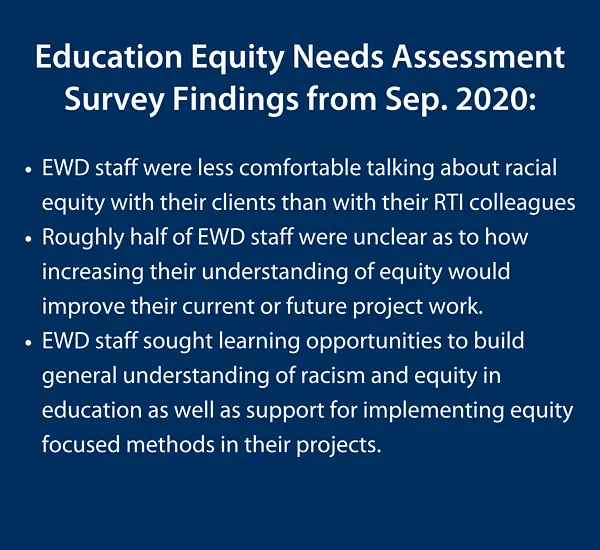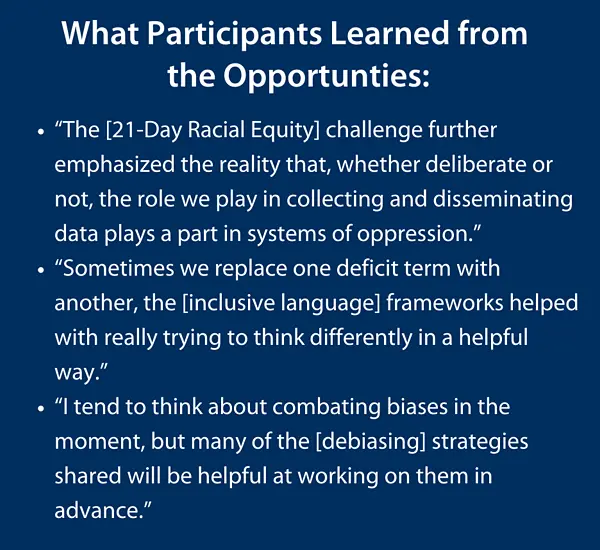Federal and non-federal agencies are working in various ways to reduce inequities for children, youth, families and communities. Clients of RTI International’s (RTI) Education and Workforce Development (EWD) division, which include school districts, postsecondary institutions, non-profit organizations, and foundations, are attempting to address and dismantle centuries of oppressive practices that created inequitable outcomes. In recent years, EWD staff noted an increase in requests for proposals for research, evaluation, and technical assistance related to education equity, and clients are requiring partners with a deep understanding of this challenge.
To help our clients meet their goals of addressing structural racism and inequity in education, RTI empowered an Education Equity Committee in June 2020, with the mission “to develop skills and practices to address the current and historical systemic inequities, and particularly racial inequities, that lead to differential outcomes for children and adults.” By embedding an understanding of equity in our work, education researchers, practitioners, and technical assistance providers will help our clients better identify the systemic issues that prevent equitable outcomes and make effective decisions to achieve their success goals for children, youth, families, and communities.
Dan Pratt, EWD Vice President, explains why RTI invested in the Equity Committee, “This is a moral imperative for our organization whose mission is to improve the human condition. We must address the systemic inequities which have led to differential access to opportunities for learners to develop, grow, and thrive so that who you are and what you look like does not predict your outcomes.” RTI has supported time for Equity Committee work and for all EWD staff who participated in the learning activities.

How to Identify the Learning Needs of EWD Staff?
To address the learning needs of EWD’s 200 staff, the committee, comprised of representatives from each of EWD’s content areas, conducted a needs assessment survey. The survey asked EWD staff about their current knowledge and understanding of equity, whether and how equity was relevant to their work, and perceived learning needs. The survey was well received and achieved a 69% response rate. To embed equity in this process, the committee held two data discussion sensemaking sessions for EWD staff to analyze the survey data and develop shared recommendations for the committee’s work. Staff appreciated the opportunity to engage in this process with their EWD colleagues.

What learning activities were available to EWD staff?
To address staff’s desire to understand equity in education, the committee implemented these activities:
- Shared 10 minute ‘knowledge bites’ at EWD town halls focused on education equity topics, such as school desegregation and critical race theory in education.
- Invited presentation from Dr. Eric Houck (UNC-Chapel Hill) on school funding and equity.
- Hosted an EWD-wide 21-Day Racial Equity Challenge where staff participated in daily readings and reflection with content tailored to education equity (e.g., Eurocentric school curriculum, race conscious policies in higher education) and application of equity to our work at RTI (e.g., equity principles in data visualization). Over 30 staff participated. This 21-Day Racial Equity Challenge was modeled after a challenge implemented in EWD’s Center for Research, Evaluation, And Equity in Education in August 2020.
Research and experience with professional development for equity suggests that training requires a holistic support system that involves building critical consciousness of the researcher as well as the skills to embed equity in research processes. Numerous training opportunities currently available for RTI staff, such as the trainings conducted by the Durham, NC based Equity Paradigm Institute and RTI-internally developed Ally Training build staff’s critical consciousness and awareness about racism, white supremacy, and implicit bias. Guided by the principle that effective professional learning is job embedded, the committee developed learning activities to support technical skill development. These included:
- Workshops focused on a specific area of practice with applicable tools, frameworks, and resources as take-aways. Two trainings offered in 2021 included one on inclusive language and another on cognitive debiasing. Over 50 EWD staff attended each workshop and participants were able to unpack the concepts and practice skills in small group conversations.
- RTI’s newly launched Transformative Research Unit for Equity will offer an in-depth 6-month training for EWD staff to learn how to implement equity-centered methodology. The cohort training translates general awareness and understanding built in other RTI trainings to the research process, such as awareness of implicit biases in research. The learning outcomes and structure of the training was created by the Education Equity Committee. The training will launch in March 2022 and the pilot will support EWD staff.
“Equity work requires a personal and collective commitment to the abiding journey of consciousness-raising, learning, and growth. EWD is committed to this journey and the steps necessary to address equity concerns in all of our work” - Dan Pratt. The committee will continue to develop professional development offerings for EWD in 2022 that focus on translating consciousness raising and learning to our methodologies and the way we work with clients.